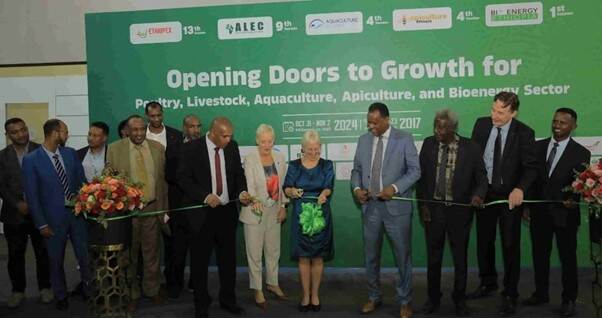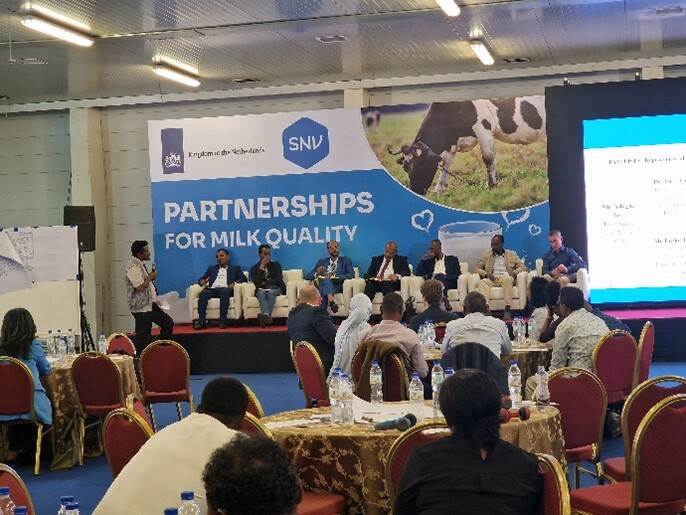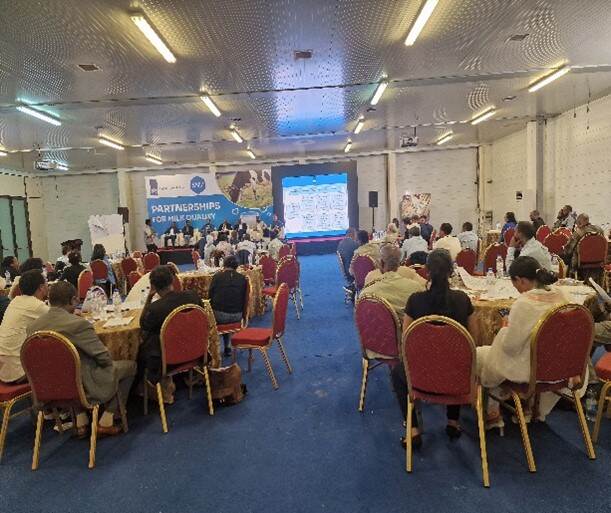Driving Dairy Sector Development in Ethiopia: Insights from the NL participation at the African Livestock Exhibition Congress (ALEC) 2024 and the BRIDGE+ Program
The African Livestock Exhibition and Congress (ALEC) is one of Africa's largest trade events for animal husbandry, attracting industry professionals to foster sector development through trade, technology, knowledge transfer, and investment. The Embassy played an active role in ALEC by hosting an "NL Pavilion" featuring over 14 Dutch companies and organizations, organized by the Agriculture team of the Embassy. The pavilion served as a platform to showcase Dutch inputs and equipment in Dairy and Poultry, highlight business opportunities, and facilitate knowledge and technology exchange.

The pavilion was organized in close collaboration with SNV, the Netherlands Development Organization, which is implementing the Netherlands-supported BRIDGE+ program. This program focuses on supporting smallholder farmers and stakeholders across the dairy value chain to establish a sector in Ethiopia that produces safe and high-quality milk. It connects Dutch businesses operating in Ethiopia that provide high-quality inputs, such as feed, modern technology, and knowledge transfer through training. Additionally, the program identifies key challenges across the dairy value chain and works closely with the Netherlands Embassy in Addis Ababa to drive structural improvements and promote sustainable growth in the sector.
Milk production in Ethiopia- a great opportunity to improve!
Ethiopia’s dairy sector, primarily based on traditional farming methods, holds significant potential for growth but faces challenges with low productivity. Of the country’s 66 million cattle, the average milk per cow per day is just 1.45 liters. On the contrary, crossbred cows yield 5–6 liters under smallholder care, but only 2 million (3%) of Ethiopia's cattle are crossbred or exotic cows. Commercial operations can produce up to 11 liters. Thus, expanding the dairy value chain and increasing crossbreeding could greatly enhance milk production, boosting household income and improving food security across the country.
Until recently, Ethiopia's dairy sector lacked regulation and heavily adulterated milk flooded the market, sold at lower prices yet still generating profits. The practice of adulteration was common across the supply chain, from farmers to processors. This, combined with limited product diversity and minimal distribution networks, restricts dairy sector growth, particularly in urban areas. In response, the BRIDGE+ program works together with the government to introduce regulatory standards, reducing adulteration, strengthening cooperatives, and aligning processors with new standards. Political commitment and proactive regulators were crucial in achieving this significant shift.
For smallholder farmers, challenges such as a lack of knowledge and skills in modern dairy practices, limited access to necessary products and services for intensification, and restricted market access hinder their ability to modernize.
Environmental concerns are significant, as traditional cattle contribute substantially to greenhouse gas emissions. Improving productivity through better genetics and enhanced practices could make the dairy sector more sustainable and climate-resilient, transforming it into a key driver of both economic growth and environmental stewardship.
"White water or milk? Improvement of Milk quality and Safety in Ethiopia" Side Event at ALEC 2024

The Agricultural team together with Food & Nutrition Security colleagues and the SNV team organized a successful side-event during the International African Livestock Exhibition and Congress (ALEC) in Addis Ababa. The event "White water or milk? Improvement of Milk quality and Safety in Ethiopia", provided an essential platform for dialogue and cooperation among key stakeholders in Ethiopia's dairy sector. By bringing together 90 stakeholders from across the dairy value chain, this event highlighted the contributions of the BRIDGE+ program to improving milk quality in the country by providing updates on the program's activities, which were supported by the Netherlands. It was a potent knowledge-sharing catalyst that increased the contribution of the Embassy of the Kingdom of the Netherlands to the development of Ethiopia's dairy industry. Successful practices were also discussed in the event, including initiatives that significantly reduced milk adulteration in important milkshed areas from 35% to 0% and that outlined the roles of value chain participants in further improving milk quality. (see video)
